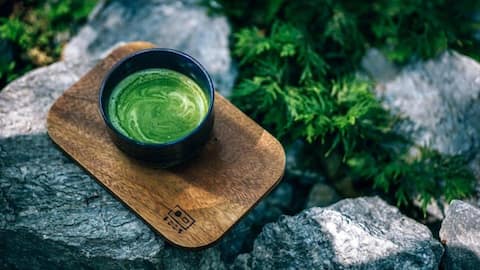Here's how matcha is becoming a global obsession
What's the story
Once a rare find in the UK, matcha, a Japanese tea powder, has now become a common sight in cafes and supermarkets worldwide. The vibrant green tea is enjoyed three times a week "without fail" by enthusiasts like London-based marketing manager Anja Opie. Its popularity has even reached the hands of celebrities such as Gwyneth Paltrow, Kylie Jenner, Rihanna, and Brad Pitt.
Matcha mania
Matcha's versatility fuels its popularity
Matcha's versatility is a key factor in its global appeal. It can be used in a variety of dishes and drinks, from iced lattes and energy drinks to pancakes and mousse. The tea powder can be served hot or cold, in its traditional form, or with a twist of yuzu or lavender. It's also easily accessible, available online from specialist tea companies or in teabags at local supermarkets.
Market growth
Matcha's market value set to soar
Matcha, derived from the Camellia sinensis plant, is known for its earthy taste from high chlorophyll levels. Its global market value is expected to rise from $2.3 billion (₹19,090 crore) this year to $2.9 billion (₹24,070 crore) by 2028, reflecting growing interest in Asian culture and cuisine. For those reducing caffeine intake, matcha offers a gentler option with around 70 mg of caffeine per serving, compared to coffee's 80-100mg.
UK trend
Matcha's popularity spreads beyond London
While the coffee market still dominates at $130 billion (₹10,790 crore), matcha's market is forecast to grow at a quicker rate, according to Mordor Intelligence. The enthusiasm for matcha extends beyond London to cities like Glasgow. In fact, Godshot Studios's strawberry matcha is praised as the city's best. A 2021 review in the National Library of Medicine attributes matcha's potential health benefits to its high antioxidant and anti-inflammatory content, though it notes that more extensive research is needed.
Digital impact
Matcha's social media success and cultural conversations
Matcha's popularity on platforms like TikTok is driven by its visually appealing colors and artistic presentation. New York's Blank Street, known for its minimalist design, is a top matcha brand on TikTok. However, the global commodification of matcha has raised concerns about cultural appropriation. Sam Thorne, CEO of Japan House in London, notes that while some reserve matcha for traditional tea ceremonies, others enjoy it in ice cream or confectionery.
